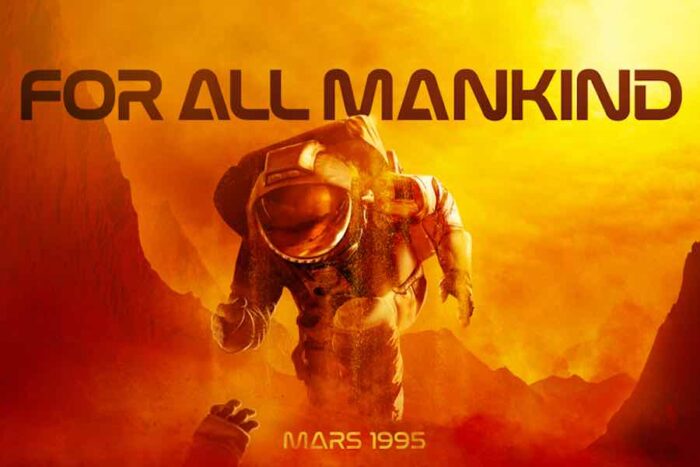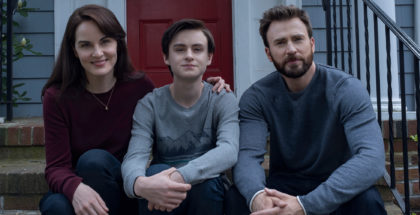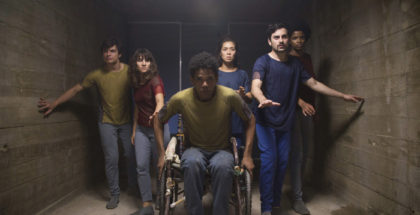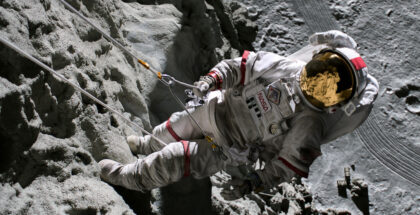First look UK TV review: For All Mankind Season 3
Review Overview
Cast
10Characters
10Consequences
10David Farnor | On 10, Jun 2022
Season 3 premieres on 10th June, with new episodes arriving weekly. This spoiler-free review is based on the opening episodes. Warning: Contains spoilers for previous seasons. Never seen the show? Read our review of Season 1 here and our review of Season 2 here.
The more things change, the more they stay the same. That fundamental truth is at the heart of For All Mankind’s astronomical success. Now in its third season, the inspired opening question of what would happen if the Soviets got to the moon before the US still lingers with added timely resonance, but it’s also been left behind by a show that has never felt more propulsive. It helps that the show has performed several time jumps, this time taking a giant leap into the 1990s where the moon is almost a forgotten concern of the past. In its place? Mars.
By setting its sights on the red planet, For All Mankind opens up a whole new world of possibilities but remains resolutely rooted in its core ensemble that was there at the start of this space race. That decision could limit the show, but the writing team, led by showrunner Ron D Moore, use that carefully calibrated balance of scope and scale to give the drama its direction and focus – and, the more finely honed the writing gets, the more explicit and knowing its approach becomes.
We catch up with everyone in 1992, when the Russians announces a plan to launch a mission to Mars in a matter of years. And so NASA kicks its own operation into gear, with the key question being who will lead it. Margo Madison (the superbly determined Wrenn Schmidt), who has gone from being a pioneering woman in mission control to the head of NASA, is keen to give key pilot Danielle Poole (a wonderfully steely Krys Marshall) the job, but that puts her at odds with veteran Molly Cobb (Sonya Walger – stubborn as ever), who thinks that Ed Baldwin (Joel Kinnaman) should head things up, thanks to his experience on the proverbial ground.
Elsewhere, Ellen Wilson (Jodi Balfour) has walked away from NASA in favour of politics and is readying a presidential campaign, if she can make peace with having a conservative running mate. And Karen Baldwin (Shantel VanSanten) has turned her experience into becoming a bonafide space businesswoman, operating her own space hotel.
If the Baldwin name pops up a lot, that’s no coincidence, as the family continues to play a decisive role in almost every aspect of humanity’s ventures into the stars – something that would be improbable if the real world’s corridors of power weren’t full of nepotism. But For All Mankind takes the omnipresence of the Baldwins and their space compatriots and uses that to explore how these characters have become natural legends over time – and, moreover, explores how these characters deal with and react to that.
It’s in these moments that the cast really excel, with Joel Kinnaman’s brilliantly sour screen presence a perfect fit for Ed’s workaholic and bitter NASA icon, who is grudgingly aware of his gradual and inevitable ageing – right down to an injury in the opening episode that he struggles to shake. Shantel VanSanten’s Karen, meanwhile, makes a healthier display of moving past grief and clearly enjoys stepping out from Ed’s shadow to forge her own successful path based on her own legacy.
Even characters no longer with us leave a trail of debris that can upend the happiest of occasions, with the sacrifice made by Tracy and Gordo Stevens in Season 2 still looming in the background – we soon learn that their story has been immortalised on screen in Love in the Skies, a movie starring Meg Ryan and Dennis Quaid. Closer to home, their sons are both still processing their loss in different ways. Danny (Casey W Johnson) has become a star player at NASA in his own right, beginning the season with a wedding aboard Karen’s space hotel – just in case you’d forgotten the awkwardness of Danny and Karen hooking up last season. Disrupting the ceremonies is Danny’s dishevelled brother, Jimmy (David Chandler), who can’t bear to see Danny following in their parents’ footsteps.
That interplay between generations only gets more elegant and complicated the more For All Mankind continues, such as Ed’s rich dynamic with Danny – a surrogate for him in many ways after two major losses. But it’s also about the wider world’s perception of the generation that went before and paved the way to the skies, and the consequences of every decision made by their elders that never stop sending ripples through their lives.
For All Mankind’s ability to seamless intertwine the personal and political is as sharp as ever, from questions of power, fame and influence to wider cultural observations and commentary that ranges from conspiracy theories to the media. With the sense of shifting tides and times comes the issue of relevance, and Ed in particular becomes a natural focal point for the entitlement felt by those first space pioneers – even as the world starts to take steps beyond them. That threat of becoming irreverent is keenly felt by all, even if they’re not aware of it, as we see Margo unwitting serve as an asset for the Soviets and Karen still subconsciously tying herself to Ed.
Season 3 leans into that theme by also introducing one of its best characters to date: Dev Ayesa (Edi Gathegi), an engineer who has become a rich force to be reckoned with, after his company capitalised on the discovery of energy source Helium-3 on the moon. Now, he has plans to become a contender in the space race too, with his company Helios echoing the growing presence of private companies in our own space industry. But this is smarter than just an Elon Musk parody – Gathegi plays his wealthy entrepreneur with a grounded presence that’s more than mere ego, and the legacy of the fight to colonise the moon for one nation or another feeds into his desire to open up Mars to everyone. It’s a smart move that opens up new frontiers for the series to break through, bringing some variety to its core ensemble that only highlights the stellar character work on display across the broad.
All this wouldn’t be possible without the show’s flawless production design, which gives us a real sense of the cogs in the machine whirring at all times to make the impossible possible, both within the dizzying world-building onscreen and behind the camera offscreen. It’s not a gritty or pristine depiction of a once-imagined future, but a practical and familiar portrait of an alternative reality that still seems eerily close to our present world. The result is a show working at the top of its game, in a way that keeps adding layers to its rich material while still – thanks to its time jumps almost giving us a fresh start each season – remaining fairly accessible to newcomers.
An expansive, emotional, ambitious and thrilling achievement, Season 3 cements For All Mankind as one of the best shows currently on TV. The more things change, the more they stay the same.



















